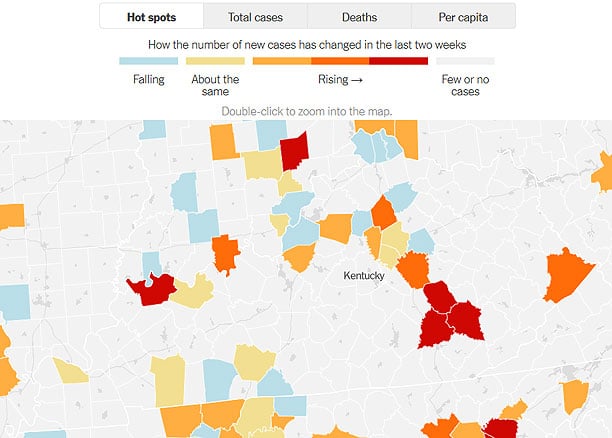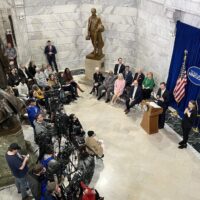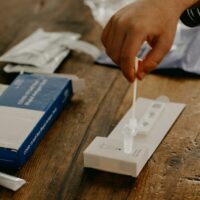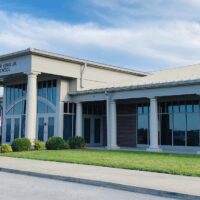Coronavirus case numbers in Kentucky continued their roller-coaster ride Saturday, when 183 new cases were reported, lowering the seven-day rolling average to 179 from 198 the day before. The state remains generally at a plateau slightly higher than the one it saw in May, during the two-week downward trend that more or less introduced the first round of relaxation of the restrictions imposed by Gov. Andy Beshear.
The new cases raised the state’s total to 16,630. Two more deaths raised the COVID-19 death toll to 524. The fatalities were a 91-year-old woman from Hopkins County and an 80-year-old woman from Jefferson County.

“The virus remains a serious threat to Kentuckians,” Beshear said in a press release. “As we try to safely return to a new normal, we can’t forget we’re still up against an invisible enemy.”
The release didn’t mention any specific preventive measures, but Beshear suggested the need to take care, and paid a implicit compliment to those who wear masks, keep their distance from others and take other precautions: “It’s another beautiful weekend, and I know we’re all wishing for a faster return to normal. But in this test of our lifetimes, we’ve stepped up to make changes that protect each other, and that has made an enormous difference.”
For current lists of cases and deaths, with breakdowns by county, race and ethnicity, click here.
Reports of a surge in coronavirus cases in southeastern Kentucky, which health officials blamed on complacency and churches reopening, are confirmed by data and illustrated by an interactive New York Times map that shows counties with rising cases rates in the last two weeks. Clay, Jackson and Laurel counties are in the top rank, with Pike, Madison and Scott counties in the next category.
School issues
The biggest challenge facing Beshear and other officials may be rules or guidelines for reopening school, as health officials say students should wear masks but superintendents say that will be difficult to enforce, partly due to parental opposition.
The elected leaders of the state Senate and the chair of the chamber’s Education Committee told interim Education Commissioner Kevin Brown in a letter that “There is a great deal of frustration among local school district leaders regarding the failure” of his Department of Education and Beshear’s Education and Workforce Development Cabinet to establish “tangible standards and directives for beginning school.”
Senate President Robert Stivers of Manchester, President Pro Tem David Givens of Greensburg and Max Wise of Campbellsville, all Republicans, told Brown that he should ask districts to offer reopening plans and evaluate them by the five risk-reduction tools the agencies issued Monday: masks, social distancing, temperature checks and other screening, hand and surface hygiene, and tracing contacts of the infected.
They attached one district’s plan as an example and concluded, “We do not underestimate the magnitude of the agency’s task, but believe it is nonetheless imperative for the local school districts to receive more tangible and specific direction.”
Football player testing
The college football season is being jeopardized because of widely varying testing regimes for players, The Washington Post reports.
Some schools, including the University of Kentucky, aren’t testing players “unless they display symptoms or are discovered to have been near an infected person.”
Instead, UK and some others are “requiring players to take antibody tests, which may indicate if players already have had the virus and might be immune from getting infected again.” UK, LSU and Arkansas are the only three Power Five conference schools the Post surveyed that aren’t mandating both coronavirus and antibody tests.
The Post reports, “One athletic administrator at a major program — who spoke on the condition of anonymity because he wasn’t authorized to speak publicly” said the lack of uniformity may be insurmountable: “The big problem here is we can put together the best policy in the world, but if they’re doing something different over in Texas or Florida, can we really travel there and play a game?”
In other COVID-19 news Saturday:
- Hazard’s WYMT-TV reports on a visitation booth on a porch at the Harlan Health and Rehabilitation Center, made possible by With Love from Harlan, which helped donate supplies. Gov. Andy Beshear has said nursing-home residents will be able to participate in some group activities including meals on Monday, June 29, and have modified visitation starting July 15.
- At least 60 of the 639 inmates at the state women’s prison have tested positive for the coronavirus, with 180 test results pending, and all inmates have been tested, state officials said. Six employees at the Kentucky Correctional Institution for Women at the western tip of Shelby County, near the Oldham County town of Pewee Valley, also tested positive. “A federal judge this week ruled against seven inmates with health problems who sued for immediate release or transfer to home confinement,” the Lexington Herald-Leader reports.
- A “Frontline” documentary on KET and PBS this week, “The Virus: What Went Wrong?” is streaming on pbs.org/frontline, the PBS Video App and YouTube.






